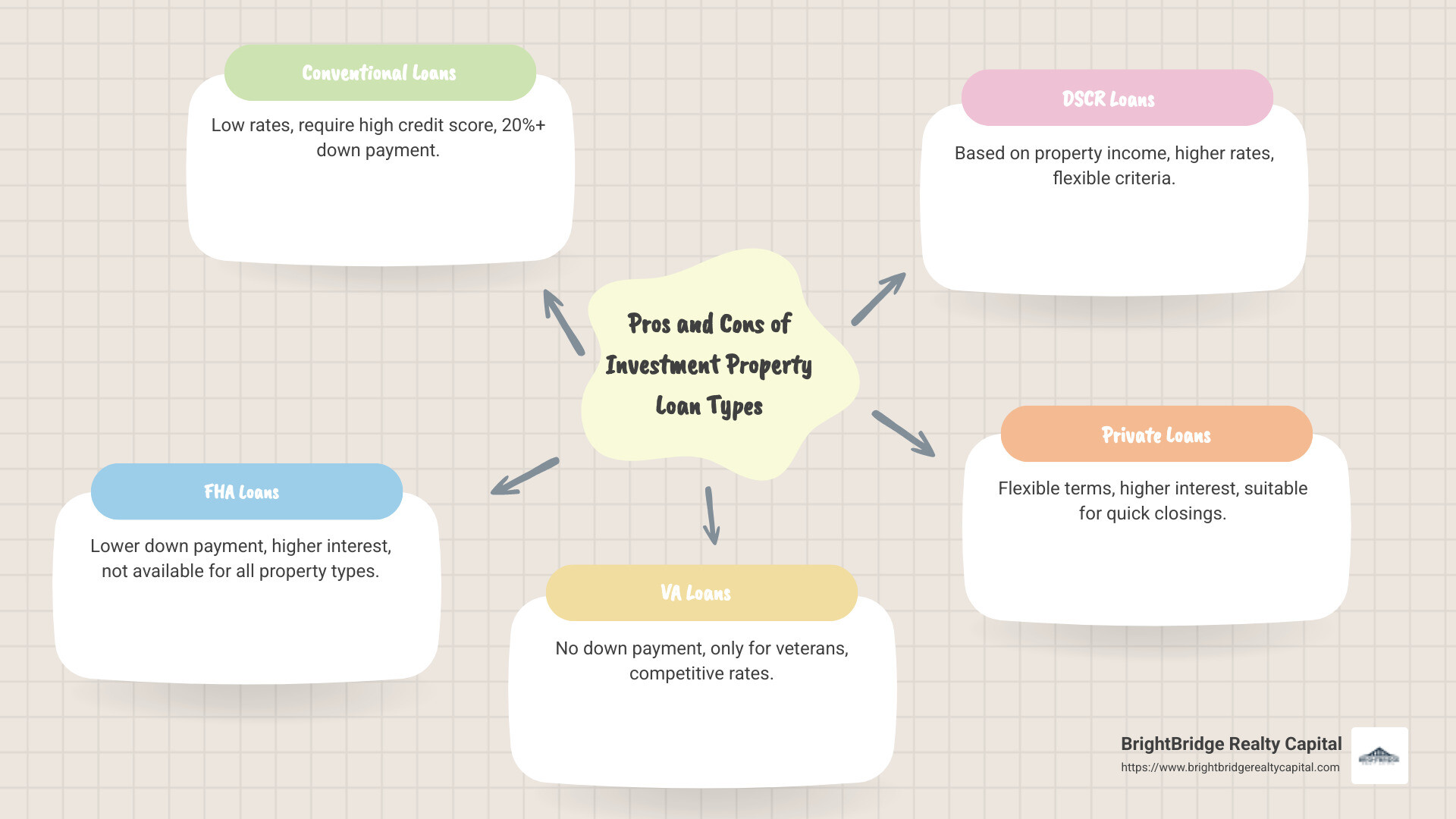Invest Smart: Low Interest Loans for Property Investors

Low interest investment property loans can transform your real estate ventures into profitable successes. For those looking to grow their rental portfolio or take on fix-and-flip projects, understanding the best financing options is crucial. In a market where interest rates fluctuate, finding loans with favorable terms can significantly boost your return on investment.
Quick facts about low interest investment property loans:
- These loans typically have higher down payments and stricter credit requirements compared to primary residence loans.
- Investing in real estate offers benefits like steady cash flow, property appreciation, and tax advantages.
- Popular loan options include conventional mortgages, FHA loans, and VA loans, each with its pros and cons.
Navigating real estate finance is challenging, especially when dealing with fluctuating interest rates. The right loan can lead to substantial savings and improved portfolio health, enhancing your ability to capitalize on lucrative investments efficiently. BrightBridge Realty Capital in New York understands these challenges, offering custom solutions to meet the diverse needs of property investors nationwide.

Simple low interest investment property loans word guide:
- lowest interest rate on investment property
- easy investment property loans
- best home loan rates for investment property
Understanding Low Interest Investment Property Loans
When diving into real estate investing, understanding the various loan types available is crucial for making informed decisions. Each loan type comes with its own set of interest rates and down payment requirements, which can significantly impact your investment's profitability.
Loan Types
Conventional Loans: These are the most common loans for investment properties. They typically require higher down payments and stricter credit scores. Conventional loans often have competitive interest rates, making them a popular choice for seasoned investors.
FHA Loans: While primarily designed for primary residences, FHA loans can sometimes be used for investment properties if the borrower lives in one of the units. These loans generally have lower down payment requirements, but interest rates can be higher due to the increased risk to lenders.
VA Loans: Available to veterans and active-duty military personnel, VA loans offer the advantage of no down payment and competitive interest rates. However, they are primarily for primary residences, with limited use for investment purposes.
DSCR Loans: These loans focus on the property's income potential rather than the borrower's personal income. They can offer favorable interest rates if the property generates sufficient rental income to cover the mortgage payments.
Interest Rates
Interest rates for investment properties are generally higher than those for primary residences. This is because lenders view investment properties as riskier. However, by improving your credit score and increasing your down payment, you can secure low interest investment property loans. Comparing rates from multiple lenders is essential to find the best deal.
Down Payments
Investment property loans often require down payments ranging from 20% to 30% of the property's value. This is higher than the typical 3% to 5% for primary residences. A larger down payment can not only lower your interest rate but also reduce the overall loan amount, leading to lower monthly payments.

Understanding these elements is key to securing a low interest investment property loan that aligns with your financial goals. By carefully selecting the right loan type and managing your finances, you can improve your investment's profitability and long-term success.
Top Loan Options for Property Investors
Finding the right loan for your investment property can make all the difference in your success. Let's explore some of the top loan options available to property investors today.
Conventional Loans
Conventional loans are the go-to for many investors. They are widely accepted and offer potentially lower interest rates, particularly if you have a strong credit score. However, they come with higher down payment requirements, often around 20% or more for investment properties. This can be a hurdle, but it also means you start with more equity in the property.
FHA Loans
While primarily aimed at primary residences, FHA loans can be used for investment properties if you occupy one of the units. They have lower down payment requirements, sometimes as low as 3.5%. That the interest rates might be higher, reflecting the increased risk to lenders. This option is ideal if you're starting out and need a more accessible entry point.
VA Loans
VA loans are a fantastic option for veterans and active-duty military members. These loans offer significant advantages like no down payment and competitive interest rates. However, they are mostly intended for primary residences, so their use for investment purposes is limited. If you qualify, they can be a powerful tool in your investment arsenal.
DSCR Loans
Debt Service Coverage Ratio (DSCR) loans are perfect for investors who focus on a property's income potential. These loans assess the property's ability to generate enough rental income to cover mortgage payments. They require less personal financial documentation, making them quicker to secure. If your property has strong rental income, a DSCR loan can offer favorable interest rates.
Private Loans
Private loans offer flexibility and speed, often with less stringent credit and income requirements. They're ideal for those needing quick funding or who might not qualify for traditional loans. However, interest rates are usually higher, and terms are shorter, which means they are better suited for short-term investments or bridge financing.

Choosing the right loan depends on your specific situation and investment strategy. Each option has its pros and cons, so weigh them carefully to find the best fit for your investment goals.
Benefits of Low Interest Loans
Low interest investment property loans are more than just a cost-saving tool. They can significantly impact your overall investment strategy. Let's break down the key benefits:
Tax Benefits
Low interest loans often come with tax perks. You can usually deduct the interest paid on these loans from your taxable income. This deduction can lead to substantial savings, especially for investors with multiple properties. Imagine paying less in taxes while your property's value grows!
Cash Flow
Lower interest rates mean lower monthly payments. This reduction boosts your cash flow, leaving more money in your pocket each month. Improved cash flow gives you the flexibility to reinvest in your property, handle unexpected expenses, or even expand your portfolio. It's like having a financial cushion that grows with time.
Return on Investment (ROI)
A lower interest rate translates to a higher ROI. When you pay less in interest, more of your rental income goes directly to your bottom line. This can make a significant difference over the life of the loan. For example, a 1% reduction in interest can save thousands of dollars, increasing your overall profit. Higher ROI means your investment works harder for you.
In summary, low interest loans are not just about saving money. They improve your investment's performance, offering tax savings, better cash flow, and an improved ROI. This makes them a smart choice for any savvy property investor looking to maximize their financial success.
How to Qualify for Low Interest Investment Property Loans
Securing low interest investment property loans is not just about finding the right lender; it's also about meeting specific criteria. Let's explore the key factors that can help you qualify:
Credit Score
Your credit score is crucial. Most lenders require a minimum score of 620, but a score of 720 or higher can open up better terms and lower interest rates. A higher credit score indicates to lenders that you're a reliable borrower, which can lead to more favorable loan conditions.
Tip: Regularly check your credit report for errors and pay down existing debts to boost your score.
Income Requirements
Lenders want to ensure you can repay the loan, so your income plays a significant role. They often look at your debt-to-income (DTI) ratio, which compares your monthly debt payments to your income. A lower DTI ratio is better, as it shows you have more income available to cover new loan payments.
Example: If your monthly income is $5,000 and your debts are $1,500, your DTI is 30%. Lenders typically prefer a DTI below 45%.
Property Analysis
The property itself is a critical part of the loan approval process. Lenders will evaluate its potential to generate rental income. They often require that the expected rental income is enough to cover the monthly mortgage payments.
Did you know? Many lenders use the Debt Service Coverage Ratio (DSCR) to assess this. A DSCR above 1 indicates the property can generate enough income to cover its debts.
In summary, qualifying for low interest investment property loans involves a combination of a strong credit score, manageable income requirements, and a thorough property analysis. By focusing on these areas, you can improve your chances of securing a loan with favorable terms.
Frequently Asked Questions about Low Interest Investment Property Loans
What is the minimum down payment required?
When it comes to low interest investment property loans, the required down payment is usually higher than for a primary residence. Typically, lenders expect a minimum of 15% to 20% down. However, putting down more than 20% can sometimes help you secure even lower interest rates. This is because it reduces the lender's risk, showing them that you're serious about the investment.
How do interest rates for investment properties compare to primary residences?
Interest rates for investment properties are generally higher than those for primary residences. The reason? Investment properties are considered riskier for lenders. According to research, rates can be 0.5% to 0.75% higher. However, with a strong credit score and a larger down payment, you can still find competitive rates that make your investment worthwhile.
Can rental income be used to qualify for a loan?
Yes, rental income can indeed help you qualify for a loan. Many lenders use the Debt Service Coverage Ratio (DSCR) to determine if the property's income can cover the mortgage payments. If the DSCR is above 1, it shows that the property generates enough income to cover its debts, making it easier to qualify. This is particularly useful for investors looking to maximize their borrowing potential.
By understanding these key aspects, you can better steer the process of securing low interest investment property loans and make informed decisions that benefit your investment strategy.
Conclusion
In real estate investing, finding the right financing can make all the difference. BrightBridge Realty Capital stands out as a leader, offering custom solutions for investors seeking low interest investment property loans. Our approach focuses on speed and efficiency, ensuring that you can seize opportunities as they arise.
Fast Closings: One of our key advantages is our ability to close deals quickly. We understand that timing is crucial in real estate, and our streamlined process often allows for closings within a week. This speed means you can act fast when the perfect investment property becomes available, without the usual delays.
Direct Lending: By cutting out intermediaries, we provide a seamless experience with competitive rates. Direct lending not only simplifies the process but also allows us to offer more flexible terms custom to your needs. This approach helps us keep costs down and pass those savings on to you.
Whether you're new to investing or a seasoned pro, partnering with BrightBridge Realty Capital can help you achieve your real estate goals. Our expertise and commitment to client success make us the go-to choice for investors looking to optimize their portfolios with low interest investment property loans.
Ready to explore your options? Contact us today to learn more about how we can support your investment journey.


